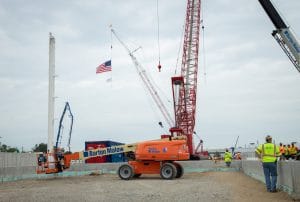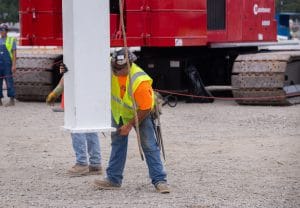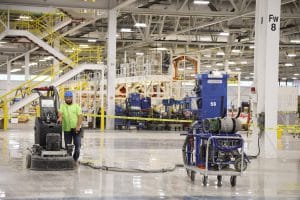
The first steel column in the new paint shop for the new $1.6-billion assembly plant that Fiat Chrysler Automobiles N.V. is building on Detroit’s east side has been put in place and FCA officials are vowing the factory will be ready to build vehicles by the end of 2020.
The new paint shop is the linchpin of a massive $4.5 billion initiative to remake FCA’s industrial foot print in and around Detroit.
“The is the first of 299 vertical columns,” said the senior manager of for FCA Paint Facilities, who is overseeing the construction of 489,000 square foot building that will house the high-tech paint shop, which will release only one third of emissions from the 28-year-old FCA Jefferson North Assembly plant next door.
(Fiat Chrysler to Open New Jeep Plant, Add 6,500 Jobs)
Bob Sabaitis, business agent for Iron Workers Local 25, who members are working on the building’s steel structure, predicted the vertical column will go up quickly. “When you come by in a week you will see a lot of them,” he told reporter touring the muddy site.
“This is an exciting project because of the accelerated schedule,” noted Eric Goedtel, senior project manager for FCA Building Group, which is responsible for the project.
The schedule calls for the construction of the paint shop to be complete by the end of the first quarter of 2020, he said, and to be operational by end of the third quarter of 2020. The first vehicles should roll off the new assembly line at the end of next year.
The new plant’s body shop and assembly unit will be housed in what was once a complex of two separate factories, covering more than 1.6 million square feet, that once built engines for FCA. One plant closed in 2012 but the second plant was in operation right up until June.

Both buildings are undergoing extensive renovations as part of the sweeping overhaul of the site, which includes the construction of an enclosed conveyor system to move unfinished vehicles from the body shop to the paint shop and then into the final assembly plant where the interior, engine and wiring as well as tire and steering gear are fitted into the vehicle.
As part of overhaul, the existing structures are outfitted with LED lighting, which are brighter and will reduce FCA’s lighting bills by as much as 80%, Goedtel said.
(FCA Spending $788M to Build 500 BEV in Italy)
In addition, the drainage around the plant is being revamped entirely so FCA won’t have to put a runoff into the City of Detroit’s overburdened sewer system. Instead the water will be reused on the site or diverted into a wetland area FCA is creating to handle run off from the plant, said Greg Rose, FCA director of environment, health and safety.
By the numbers, the project is huge. FCA is laying down more than 3 million square feet of paving, 30,000 linear feet of underground piping and has moved 485,000 tons of direct and brought in 375,000 tons of stone.
The new plant is located in a corner of the city used by the auto industry more than a century and body shop will sit on the site that once belonged to the old Briggs Manufacturing Co., which stamped out car body parts not only for Chrysler, FCA’s predecessor, but also other carmakers.
The site was purchased by Chrysler in 1953 and closed in 1979 and later demolished. But contractors working for FCA found remnants of the old building as they bored down as much as 120 feet to place the caissons on which the paint shop will rest. “It’s part of the challenge of building in an urban environment,” said Goedtel.
The project also calls for construction of a new wall at the edge of the FCA property to protect the residential property to adjacent. FCA has said new Mack Avenue plant is expected to create 3,850 new jobs

In addition, FCA plans to spend $900 million investment to re-tool the adjacent Jefferson North assembly plant for continued production of Dodge Durango and next-generation Jeep Grand Cherokee, creating 1,100 additional new jobs.
FCA is also committed to renovating Warren Truck plant in suburban Detroit for an additional $1.5 billion for production of all-new Jeep Wagoneer and Grand Wagoneer, as well as continued assembly of Ram 1500 Classic.
(FCA Doesn’t Know the Meaning of the Word “Old”)
The automaker also is spending $119 million to renovate an engine plant in Dundee, Michigan, south of Detroit to which the engine work on the Mack site was moved and another $400 million to upgrade stamping plants in Warren and Sterling Heights, Michigan, in suburban Detroit.








Good reporting.
A map or a description of the location would have been useful. I live not far from there and I would like to visit